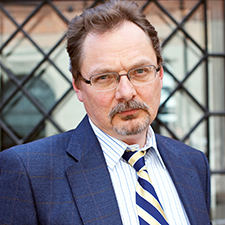Great Power Competition in the Arctic | 2020 | Events

Russia may not qualify as a Great Power on the global arena, but it is without doubt a “Great Arctic Power” – and seeks to uphold this status and to capitalize on it. There has been for the last 12 years a gradually-expanding discrepancy between two policy tracks: Developing international cooperation in the Arctic and building a position of military superiority in the Barents region. Presently, major setbacks on the first track and major advances on the second have distorted the balance between them and turned Russia’s Arctic policy excessively (and unsustainably) militaristic. Even the grand design for modernizing the Northern Sea Route (Sevmorput) is centered on military protection, while the economic rationale suffers. The only external impact that constrains the militarization of Russia’s Arctic policy comes, counter intuitive as it may seem, from China. The Arctic constitutes only a secondary avenue in the Belt & Road initiative, and investments are comparatively small, but they make a difference, particularly for the Sevmorput. What China doesn’t want to see in this region is arms race and military tensions, which could hamper its gradual economic “foot-printing”. Northern European states, while increasing their defense cooperation and relying on NATO activities, find it useful to increase ties with China, and in the escalating US-China competition, the Arctic could be an area of mutually beneficial interactions.
Bio:
Dr. Pavel K. Baev is a Research Professor at the Peace Research Institute, Oslo (PRIO); he is also a Senior Non-Resident Fellow at the Center for the United States and Europe (CUSE) at the Brookings Institutions, Washington DC; a Senior Associate Researcher at the Institut Francais des Relations Internationales (IFRI), Paris; and a Senior Associate Research Fellow at the Italian Institute for International Political Studies (ISPI, Milan). After graduating from the Moscow State University (MA in Political Geography, 1979), he worked in a research institute in the USSR Defence Ministry, received PhD in International Relations from the USA & Canada Institute, USSR Academy of Sciences (1988), and then worked in the Institute of Europe, Moscow, before joining PRIO in October 1992. His research on Russia’s policy in the Middle East is supported by the Norwegian Foreign Ministry; other research interests include the transformation of the Russian military; the energy and security dimensions of the Russian-European relations; Russia’s Arctic policy; Russia-China partnership; and post-Soviet conflict management in the Caucasus and the greater Caspian area. His weekly column appears in Eurasia Daily Monitor (http://www.jamestown.org/programs/edm).
This event is co-sponsored by the MIT Security Studies Program, the MIT Center for International Studies, and MIT Russia
